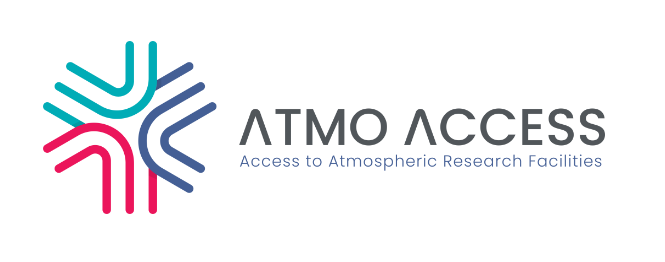Projekt badawczo-organizacyjny
Zapewnienie zrównoważonego dostępu do rozproszonych atmosferycznych infrastruktur badawczych ATMO-ACCESS
| dr hab. Iwona S. Stachlewska | Koordynator projektu na UW |
| dr Anetta Drzeniecka-Osiadacz | Główny wykonawca |
| dr hab. Mariola Jabłońska | Główny wykonawca |
| dr Łucja Janicka | Główny wykonawca |
| dr Dominika Szczepanik | Główny wykonawca |
| mgr Afwan Hafiz | Wykonawca |
| mgr Maciej Karasewicz | Wykonawca |
| prof. dr hab. Szymon P. Malinowski | Współwykonawca |
| prof. dr hab. Krzysztof Markowicz | Współwykonawca |
| licencjat Igor Okraska | Wykonawca |
| dr Christiana Olusegun | Wykonawca |
| mgr Emeka Ugboma | Wykonawca |
| dr inż. Mateusz Winkowski | Wykonawca |
Projekt "Zapewnienie zrównoważonego dostępu do rozproszonych atmosferycznych infrastruktur badawczych" (ATMO-ACCESS) finansowany jest przez Komisję Europejską w ramach Horyzontu 2020 i koordynowany przez Centre National de la Recherche Scientifique (CNRS) we Francji. Łączy siły rozproszonych infrastruktur badawczych (IB), głównie ACTRIS (w tym EUROCHAMP) i INGOS/ICOS oraz ekspertyzy innych infrastruktur (w tym IAGOS). ATMO-ACCESS jest projektem pilotażowym, który ma na celu zdefiniowanie sposobów zapewniania trwałego dostępu do istniejących i przyszłych infrastruktur badawczych w dziedzinie badań atmosferycznych. Dostęp fizyczny, zdalny oraz wirtualny do rozproszonych infrastruktur badawczych ma być docelowo przyznawany w przyszłych programach UE w ramach Horyzontu-Europa. Punktem wyjścia w ATMO-ACCESS jest praca poczyniona nad dostępem do infrastruktur badawczych w ramach ENVRI-PLUS i ACTRIS PPP. Nie jest to klasyczny projekt INFRAIA, ale pilotaż przygotowujący do przyszłych zgłoszeń.
UWAGA: W ramach ATMO-ACCESS oferujemy TRANS-NATIONAL-ACCESS (TNA), czyli fizyczny i zdalny dostęp do infrastruktur badawczych w trzech laboratoriach Warsaw Observatory Station (Koordynator Stacji dr hab. Iwona Stachlewska, prof. ucz.): Laboratorium Pomiarów Zdalnych (RS-Lab), Laboratorium Transferu Radiacyjnego (RT-Lab) i Laboratorium Mechaniki Płynów (FD-Lab).
Dostęp fizyczny (physical TNA access) koordynuje Łucja Janicka.
Dostęp zdalny (remote TNA access) koordynuje Dominika Szczepanik.
The European research community of atmospheric sciences has received 15 million euros from the H2020 Programme of the European Commission, in order to promote access to its research infrastructures. The ATMO-ACCESS consortium (“Sustainable Access to Atmospheric Research Facilities”) gathers together 38 scientific institutions from 19 European countries of the atmospheric research infrastructures ACTRIS, ICOS et IAGOS, and is coordinated by the French National Research Centre (CNRS).
Allowing sustainable access to research infrastructures is a key element for scientific innovation but also for economic growth. Currently, several logistic, financial, and administrative obstacles limit optimal access to such infrastructures, besides some specific frameworks. The main goal of ATMO ACCESS is to develop solutions for sustainable access to atmospheric research facility services, which could also be applied to other domains, especially research infrastructures distributed in different countries.
In this project, the entire scientific community, as well as private sector actors, will have the opportunity to access the main European research platforms, participate in scientific experiments, train new measurement techniques, test new sensors, or develop new applications based on data from research infrastructures. The project will also mobilize drones or laboratory trucks in support of scientific experiments and new remote access capabilities which are particularly important during periods of restricted mobility, such as the COVID-19 pandemic, or to reduce the carbon footprint. ATMO-ACCESS will open physical and remote access to 43 operational European atmospheric research facilities (ground-based observation stations, simulation chambers, but also mobile facilities and central laboratories). Additionally, innovative cross-RI cloud services, addressing the management of data produced via access and the use of new, integrated data products, but also virtual tools for training, are offered through virtual access to RI data centers.
All work in ATMO-ACCESS integrates experiences from past access programs, thus, synergistically streamlining the work and avoiding duplication of efforts. ATMO-ACCESS will continuously engage with users and with national and international stakeholders to propose optimal conditions for a coherent and effective framework of access and involve the relevant user and stakeholder groups to establish and ensure the long-term sustainability of access with the European RI landscape. This funding rewards a strong interaction between the 3 RIs of the Atmosphere domain ACTRIS, ICOS, and IAGOS and for the development of inter-RI services. Breaking down barriers between communities will facilitate the use of these services and allow for new scientific discoveries.
- Carneiro, Rayonil; Janicka, Lucja; Karasewicz, Maciej; Stachlewska, Iwona, 2025, Dataset for BOLAUR TNA of ATMO-ACCESS, RepOD ICM UW, vol. V1, doi.org/10.18150/8PBJLP
- Hafiz A., Stachlewska I.S., 2024, Broadband Single-channel Fluorescence in ESA Mobile Raman Lidar (EMORAL), 10th International Conference on Sensors and Electronic Instrumentation Advances (SEIA' 2024)
- Stachlewska Iwona S., 2021, Dogłębne zrozumienie smogu drogą do skutecznego przeciwdziałania zjawisku! / A thorough understanding of smog is the way to effective action!, Raport TOGETAIR, vol. Section: AIR, Chapter: Smog and emissions from the municipal sector, 9, https://raport.togetair.eu/air
02.09.2024 Training on Lidar Data Processing Tools
05.09.2023 ATMO-ACCESS TNA - 5th call for access
02.12.2022 ATMO-ACCESS TNA - 3rd call for access
15.11.2022 ATMO-ACCESS TNA grantees Barcelona 2022
14.10.2022 ATMO-ACCESS TNA grantees Warszawa 2022
28.09.2022 ATMO-ACCESS TNA - 3rd call for access
28.06.2022 ATMO-ACCESS TNA - 2nd call for access
28.10.2021 ATMO-ACCESS TNA - 1st call for access

